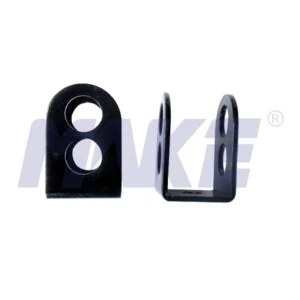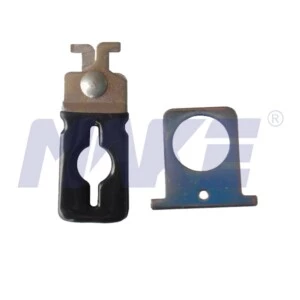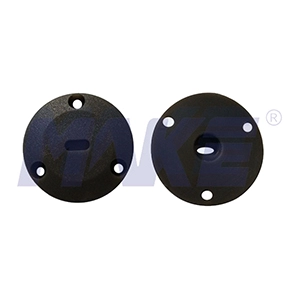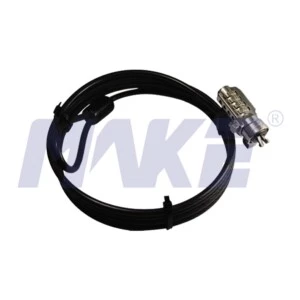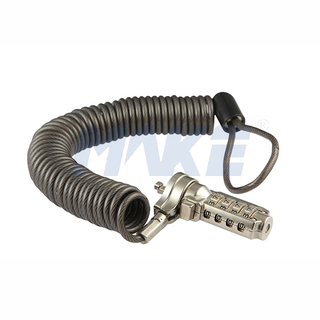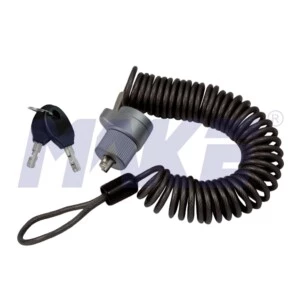1-6 of 21 results
A laptop lock typically refers to a cable lock with a special T-bar that can be inserted into a standard security slot provided by the laptop manufacturer. The cables are extremely strong, usually made of stainless steel strands and coated with PVC for durability. To secure the device, the cable is anchored to a fixed object. The T-bar is inserted into the laptop’s slot and then rotated 90 degrees using a key, effectively locking the laptop to the object via the cable lock.
We provide a wide range of security solutions, including laptop locks, laptop cable locks, computer locks, computer cable locks, locks for laptops, desktop computer locks, computer security locks, computer combination locks, computer keyed locks, iPad locks, and more. Our laptop locks are compatible with desktops, laptops, flat-panel monitors, projectors, printers, and other peripherals equipped with a standard security slot.
In today’s world, laptops have become an essential part of both personal and professional life. They store sensitive information, critical data, and valuable resources, making them not just costly electronic devices but also repositories of irreplaceable intellectual property. With the increasing mobility of work and study, laptops are often used in public spaces such as offices, cafes, libraries, airports, and co-working areas. While this mobility offers convenience, it also increases the risk of theft.
To reduce this risk, security products like laptop locks have been developed. A laptop lock, also known as a notebook lock, is a simple yet effective device designed to physically prevent laptops from being stolen. By securing the laptop to a fixed, immovable object, these locks provide a strong deterrent against opportunistic theft.
A laptop lock is a physical security device specifically designed to secure a laptop or other portable electronics. It generally consists of a cable, a locking head, and a mechanism that attaches securely to the laptop’s built-in security slot. Once engaged, the lock prevents unauthorized removal of the laptop without the use of the proper key or combination.
Simply put, a laptop lock serves as a barrier, attaching the device to a stationary object such as a desk, table, or wall mount. While it may not stop highly determined criminals with specialized tools, it effectively prevents casual theft in environments like offices, schools, libraries, or shared workspaces.
Though designs may vary by manufacturer and model, most laptop locks share a common structure. The main components include:
Cable – Typically constructed from strong, stainless steel strands braided together for flexibility and durability. The cable is often covered with a PVC or plastic coating to prevent damage to furniture and to increase resistance to cutting.
Locking Mechanism – This is the core of the system, available in either key-based or combination formats. It secures the laptop by anchoring to the device’s standard security slot.
T-Bar Lock Head – The most common interface between the lock and the laptop. When inserted into the laptop’s security slot and rotated 90 degrees, it grips securely and prevents removal without the correct key or code.
Key or Combination Dial – Depending on the model, users unlock the device either with a traditional key (tubular or abloy) or by entering a numeric code on a rotating dial.
Through the integration of these elements, a laptop lock provides an easy yet reliable physical anti-theft solution.
Laptop locks can be classified in several ways, depending on design, operation, and application. The most common distinctions include:
Key Lock – Requires a physical key to open. Popular in professional settings where IT managers control access.
Combination Lock – Uses a numeric dial system, eliminating the need for keys. Convenient for individual users who prefer not to carry extra keys.
Notebook Locks – Designed primarily for laptops and notebooks.
Desktop Locks – Used for securing desktop computers, monitors, and other electronic devices that include a standard security slot.
Key Unlock – Operated by inserting and turning a key.
Password Unlock – Operated by entering a user-set numerical code.
Tubular Key – A common key system offering a good balance of cost and security.
Abloy Key – A high-security option, more resistant to tampering and picking compared to tubular keys.
Standard Lock – Ready-made products suitable for general users.
Custom Lock – Tailored to customer requirements, offering flexible keying solutions:
Multiple Locks, One Key – A single key can open multiple locks, ideal for IT administrators managing multiple devices.
Multiple Locks, Multiple Keys – Each lock has its unique key, suitable for environments where individual control is required.
One-to-One Plus a Public Key – Each device has a unique key, along with a master key that can open all locks, giving organizations both security and administrative control.
These classification criteria make it easier for individuals and organizations to choose the right type of laptop lock for their specific needs.
When purchasing a laptop lock, it is important to consider both the security requirements and the convenience for the user. Below are some practical guidelines:
Combination Locks are ideal for users who are prone to misplacing keys. They offer quick access with a memorized code and eliminate the need for carrying extra items.
Keyed Locks are often preferred in corporate or institutional settings where IT departments manage multiple devices. A master key option adds administrative efficiency.
For general office use, a tubular key system provides sufficient protection.
For higher-risk environments, such as public libraries, exhibition halls, or co-working spaces, the Abloy key system is recommended due to its superior resistance to picking and tampering.
Consider whether the cable length is sufficient to anchor the laptop to a fixed object conveniently. A typical cable length ranges from 1.5 to 2 meters, balancing mobility and security.
Most modern laptops include a standard Kensington security slot, which supports a wide range of locks. However, for ultra-thin laptops or devices without a slot, users may need an adapter or a lock designed specifically for slim models.
Individual Users – A simple combination lock is often the most convenient.
Corporate/Institutional Users – Custom keying systems, such as “one key for multiple locks” or master key solutions, improve efficiency and security.
Laptop locks are versatile and not limited to securing laptops alone. They can also be used to protect:
Desktop computers
Monitors and flat-panel displays
Projectors
Printers
External hard drives
Docking stations
Other peripherals with standard security slots
By anchoring valuable equipment, organizations can prevent sudden theft during conferences, classrooms, trade shows, or public events.
Theft Deterrence – The presence of a lock discourages opportunistic theft, especially in shared spaces.
Data Protection – Preventing theft helps protect sensitive and confidential information stored on laptops.
Cost Savings – Avoids replacement costs of expensive devices.
Flexibility – Compatible with a wide range of equipment beyond laptops.
Administrative Control – Custom lock systems give organizations more control over device security.
A laptop lock is a simple yet highly effective physical security solution that protects laptops and other electronic devices from theft. With strong steel cables, durable locking heads, and flexible key or combination options, these locks offer a reliable way to safeguard valuable equipment in both personal and professional settings.
By understanding the structure, classifications, and purchasing considerations, users can select the most suitable lock for their needs—whether it’s for individual convenience or large-scale corporate security management. In today’s fast-paced world where laptops hold critical data and personal information, investing in a quality laptop lock is a practical and essential step toward ensuring both device and data security.

